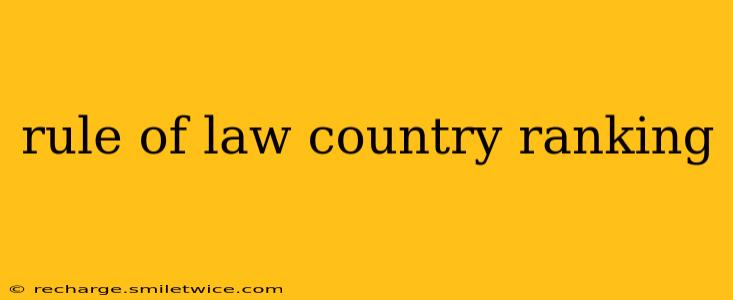The rule of law is a cornerstone of a just and prosperous society. It ensures that everyone, regardless of their position or power, is accountable under a transparent and consistently applied legal framework. But how do we measure a country's adherence to this crucial principle? Numerous organizations and institutions publish rankings evaluating countries based on their rule of law performance. This article explores these rankings, the methodologies employed, and the implications of a strong or weak rule of law.
What is the Rule of Law?
Before delving into rankings, it's crucial to understand the concept itself. The rule of law signifies that all individuals and institutions are accountable to and subject to publicly promulgated laws that are fairly applied and enforced. Key aspects include:
- Fair and efficient justice system: Accessible courts, impartial judges, and due process are essential.
- Transparency and accountability: Government actions should be open to scrutiny, and officials should be held responsible for their conduct.
- Protection of fundamental rights: Freedom of speech, assembly, and religion, alongside protection against arbitrary arrest and detention, are crucial.
- Absence of corruption: Corruption undermines the rule of law by allowing individuals to bypass legal processes and escape accountability.
- Predictability and stability: A stable and predictable legal system fosters investment and economic growth.
How are Rule of Law Country Rankings Compiled?
Various organizations utilize different methodologies to assess rule of law, resulting in variations across rankings. Common factors considered include:
- Judicial independence: The degree to which courts are free from political influence.
- Enforcement of contracts: The effectiveness of the legal system in enforcing contracts.
- Property rights: The extent to which property rights are protected by law.
- Control of corruption: Measures of government transparency and efforts to combat corruption.
- Fundamental rights: The level of protection afforded to fundamental human rights.
- Law enforcement effectiveness: The capability of law enforcement agencies to maintain order and uphold the law.
- Access to justice: The ease with which citizens can access the justice system.
These factors are often measured through surveys, expert assessments, and analysis of legal frameworks and judicial practices. The weight given to each factor can differ between ranking systems.
Which Organizations Publish Rule of Law Rankings?
Several reputable organizations provide rule of law indices, including:
- World Justice Project (WJP): The WJP's Rule of Law Index is widely recognized and uses a comprehensive methodology.
- World Bank: The World Bank's governance indicators include measures related to the rule of law.
- International Crisis Group (ICG): ICG's assessments often focus on specific regions or countries, offering in-depth analysis.
- Transparency International: While primarily focused on corruption, Transparency International's Corruption Perceptions Index indirectly reflects aspects of the rule of law.
What are the Implications of a Strong vs. Weak Rule of Law?
Countries with strong rule of law generally experience:
- Higher economic growth: A predictable legal environment attracts investment and fosters economic development.
- Reduced inequality: Fair application of the law promotes social justice and reduces disparities.
- Increased stability: A strong rule of law fosters social cohesion and reduces the likelihood of conflict.
- Improved human rights: Protection of fundamental rights is paramount in countries upholding the rule of law.
Conversely, weak rule of law often leads to:
- Economic stagnation: Uncertainty and lack of legal protection deter investment.
- Increased corruption: A lack of accountability encourages corruption and undermines public trust.
- Political instability: Absence of a fair legal system often leads to social unrest and conflict.
- Human rights abuses: Weak rule of law leaves citizens vulnerable to abuse and exploitation.
What are the Challenges in Measuring the Rule of Law?
Accurately measuring the rule of law is challenging due to:
- Subjectivity: Defining and measuring aspects of the rule of law can be subjective, leading to variations in rankings.
- Data limitations: Reliable data on rule of law indicators can be scarce, particularly in some countries.
- Political biases: Rankings can be influenced by political factors and may not always reflect the full reality.
Conclusion
While various organizations offer different rule of law rankings, they all highlight the critical importance of this principle for sustainable development and human well-being. Understanding the methodologies, limitations, and implications of these rankings provides a crucial framework for analyzing the state of justice and governance globally. It's essential to consider the nuances of each ranking system and to supplement quantitative data with qualitative assessments to gain a complete picture of a country's rule of law performance.
